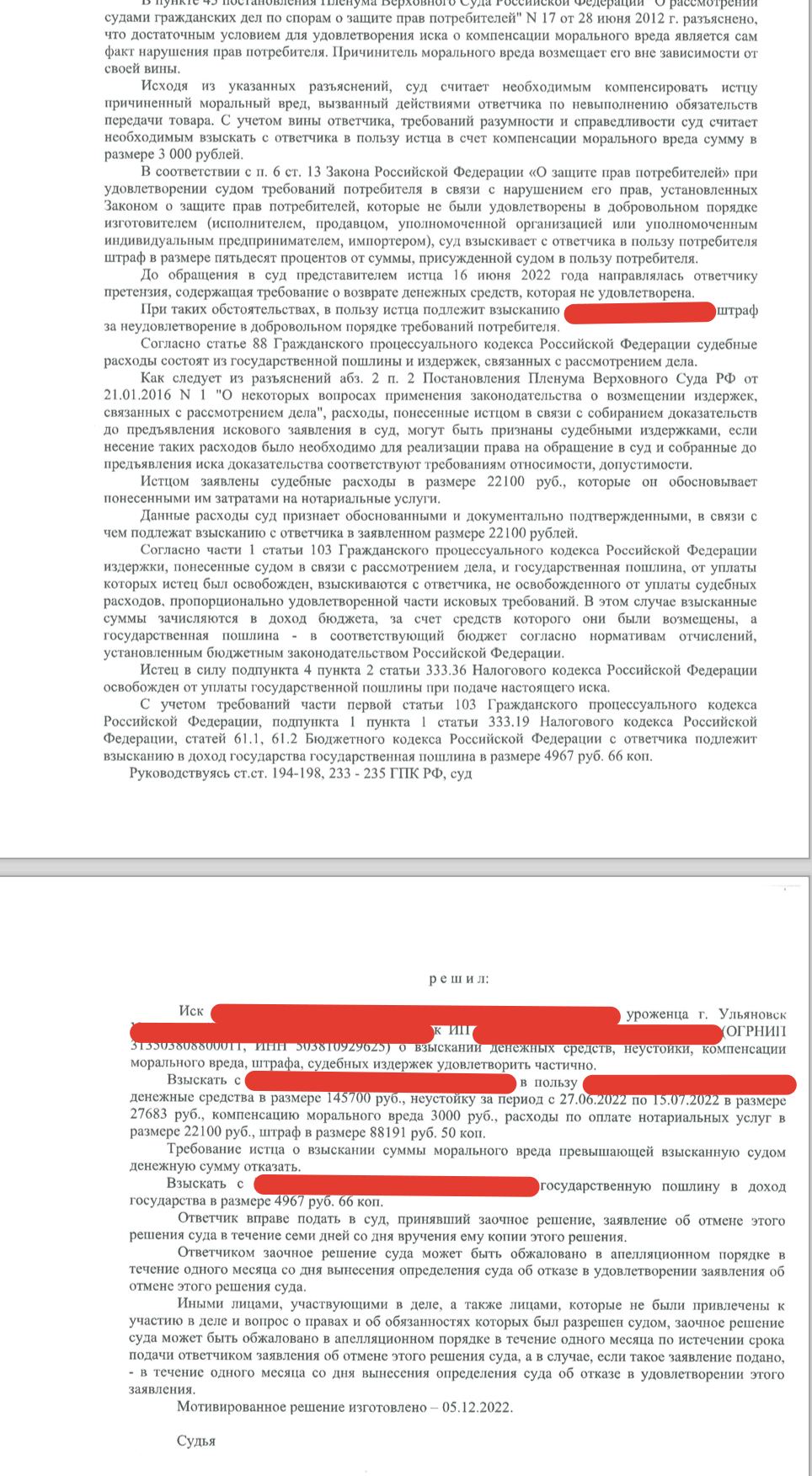The Pushkin City Court satisfied the demands of OUR CLIENT in full, collecting money for undelivered auto parts, a penalty, as well as compensation for moral damage
In accordance with Art. 497 of the Civil Code of the Russian Federation, a retail purchase and sale agreement can be concluded on the basis of familiarization of the buyer with the description of the goods proposed by the seller through catalogs, prospectuses, booklets, photographs, means of communication (television, postal, radio communications and others) or other means that exclude the possibility of direct familiarization of the consumer with goods or a sample of goods when concluding such an agreement (remote method of selling goods). Unless otherwise provided by law, other legal acts or agreement, a retail purchase and sale agreement concluded by remote sales of goods is considered fulfilled from the moment of delivery of the goods to the place specified in such agreement, and if the place of transfer of goods is not determined by such agreement, from the moment of delivery goods at the place of residence of the buyer-citizen.
In the event that the seller, who has received the advance payment amount, does not fulfill the obligation to transfer the goods within the established period, the buyer has the right to demand the transfer of the paid goods or the return of the advance payment amount for the goods not transferred by the seller (Article 487 and 3 of the Civil Code of the Russian Federation).
The provisions of Art. 432 of the Civil Code of the Russian Federation provides that an agreement is considered concluded if an agreement is reached between the parties on all essential terms of the agreement.
According to clause 13 of the Rules for the sale of goods by remote means, approved by Decree of the Government of the Russian Federation of December 31, 2020 No. 2463, the seller’s obligations to transfer the goods and other obligations related to the transfer of goods arise from the moment the seller receives the corresponding message from the buyer about the intention to conclude an agreement.
From the analysis of these legal norms, it follows that a retail purchase and sale agreement for the remote method of selling goods is considered concluded from the moment the seller receives a message from the buyer about the intention to purchase the goods, which gives rise to the seller’s obligations to transfer the goods and other obligations associated with the transfer of the goods.
According to paragraph 43 of the Resolution of the Plenum of the Supreme Court of the Russian Federation dated June 28, 2012 N 17 “On the consideration by courts of civil cases in disputes regarding the protection of consumer rights” “for remote methods of selling goods (ordering work, services), when remote communication means are used (in particular, such as mail, Internet, telephone), and payment for goods (works, services) is carried out by the consumer through electronic or non-cash payments, including using bank cards and (or) other means of payment established by law, including electronic means of payment, the fact of purchase can be confirmed by a statement from the bank account about authorization and the completion of the transaction indicating the recipient of the payment, the results of debit and credit transactions, etc., as well as other documents confirming the transfer of funds (for example, confirmation of the execution of the client’s order to carry out an electronic transfer funds issued to the client by the electronic money operator)".
The court in the case established that the plaintiff remotely agreed with the defendant to purchase auto parts, which is confirmed by the inspection protocol of written evidence and an appendix to it, certified by a notary.
The plaintiff, in consideration of the agreements reached on the purchase of auto parts, made the following payments by bank transfer to the defendant: 10/29/2021 in the amount of 50,000 rubles. (case file 109); 11/17/2021 in the amount of RUB 25,580. (ld. BUT); 11/26/2021 in the amount of 21,120 rubles. (case file 111); 12/19/2021 in the amount of 30,000 rubles. (case file 112); 12/28/2021 in the amount of 19,000 rubles. (ld. 113), and in total in the amount of 145,700 rubles. However, the plaintiff did not receive the goods.
On June 16, 2022, the representative of the plaintiff sent a claim to the defendant for the purpose of pre-trial settlement of the dispute - the return of funds previously received from the plaintiff in the amount of 145,700 rubles, which was left unsatisfied by the defendant (case file 59).
At the time of filing this lawsuit, the defendant had not returned any money to the plaintiff.
Based on the foregoing, the court comes to the conclusion that an agreement for the retail purchase and sale of goods remotely was concluded between OUR CLIENT and the defendant, according to which the plaintiff paid the cost of the goods, but the defendant did not transfer the goods, therefore the contract was not fulfilled. As a result, the court considers it necessary to satisfy the plaintiff’s demands regarding the recovery from the defendant of the stated amount of the claim in the amount of 145,700 rubles, the calculation of which does not raise doubts in the court.
Provision of Art. 22 of the Law of the Russian Federation “On the Protection of Consumer Rights” provides for the possibility of a consumer request for the return of the amount of money paid for the goods.
In accordance with Art. 23 of the above Law, in case of failure to comply with this requirement, the seller who committed the violations pays the consumer a penalty (penalty) in the amount of one percent of the price of the goods for each day of delay.
In paragraph 32 of the Resolution of the Plenum of the Supreme Court of the Russian Federation “On the consideration by courts of civil cases in disputes regarding the protection of consumer rights” No. 17 dated June 28, 2012, it is explained that a penalty (fines) in the amount established in paragraph 3 of Art. 23 of the Law of the Russian Federation “On the Protection of Consumer Rights”, in the event of a violation by the seller of the period established by the purchase and sale agreement for the transfer of pre-paid goods to the consumer, the penalty is recovered for each day of delay from the day on which, according to the specified agreement, the transfer of the goods to the consumer should be carried out, until the day the goods are transferred to the consumer or until the day the consumer’s demand for the return of the amount previously paid to him is satisfied. In this case, the amount of the penalty (penalty) cannot exceed the amount of advance payment for the goods.
Based on the above legal norms, the court finds the plaintiff’s claims for the recovery of a penalty (fine) from the defendant according to the formula presented in the claim, subject to satisfaction, since the calculation is based on the rules of law.
By virtue of Article 15 of the Law of the Russian Federation "On the Protection of Consumer Rights", moral damage caused to the consumer as a result of violation by the manufacturer (performer, seller) or an organization performing the functions of the manufacturer (seller) on the basis of an agreement with him, consumer rights provided for by the laws and legal acts of the Russian Federation Federation, regulating relations in the field of consumer rights protection, is subject to compensation by the causer of harm if he is at fault. The amount of compensation for moral damage is determined by the court and does not depend on the amount of compensation for property damage.
In paragraph 45 of the Resolution of the Plenum of the Supreme Court of the Russian Federation “On the consideration by courts of civil cases in disputes regarding the protection of consumer rights” No. 17 dated June 28, 2012, it is explained that a sufficient condition for satisfying a claim for compensation for moral damage is the very fact of violation of consumer rights. The causer of moral damage compensates for it regardless of his guilt.
Based on these explanations, the court considers it necessary to compensate the plaintiff for the moral damage caused by the actions of the defendant in failing to fulfill the obligation to transfer the goods. Taking into account the defendant’s guilt, the requirements of reasonableness and fairness, the court considers it necessary to recover from the defendant in favor of the plaintiff an amount of 3,000 rubles in compensation for moral damage.
In accordance with paragraph 6 of Art. 13 of the Law of the Russian Federation “On the Protection of Consumer Rights” when the court satisfies the consumer’s demands in connection with the violation of his rights established by the Law on the Protection of Consumer Rights, which were not satisfied voluntarily by the manufacturer (performer, seller, authorized organization or authorized individual entrepreneur, importer ), the court shall collect from the defendant in favor of the consumer a fine in the amount of fifty percent of the amount awarded by the court in favor of the consumer.
Before going to court, the plaintiff’s representative sent a claim to the defendant on June 16, 2022, containing a demand for the return of funds, which was not satisfied.
In such circumstances, a fine must be collected from the defendant in favor of the plaintiff for failure to voluntarily satisfy the consumer’s requirements.
According to Article 88 of the Civil Procedure Code of the Russian Federation, court costs consist of state fees and costs associated with the consideration of the case.
As follows from the explanations of paragraph. 2 clause 2 of the Resolution of the Plenum of the Supreme Court of the Russian Federation dated January 21, 2016 N 1 “On some issues of application of legislation on reimbursement of costs associated with the consideration of a case”, expenses incurred by the plaintiff in connection with the collection of evidence before filing a statement of claim in court may be recognized legal costs, if the incurrence of such costs was necessary to exercise the right to go to court and the evidence collected before filing a claim meets the requirements of relevance and admissibility.
The plaintiff claimed legal costs in the amount of 22,100 rubles, which he justified by the costs he incurred for notary services.
The court recognizes these expenses as justified and documented, and therefore subject to recovery from the defendant in the stated amount of 22,100 rubles.



